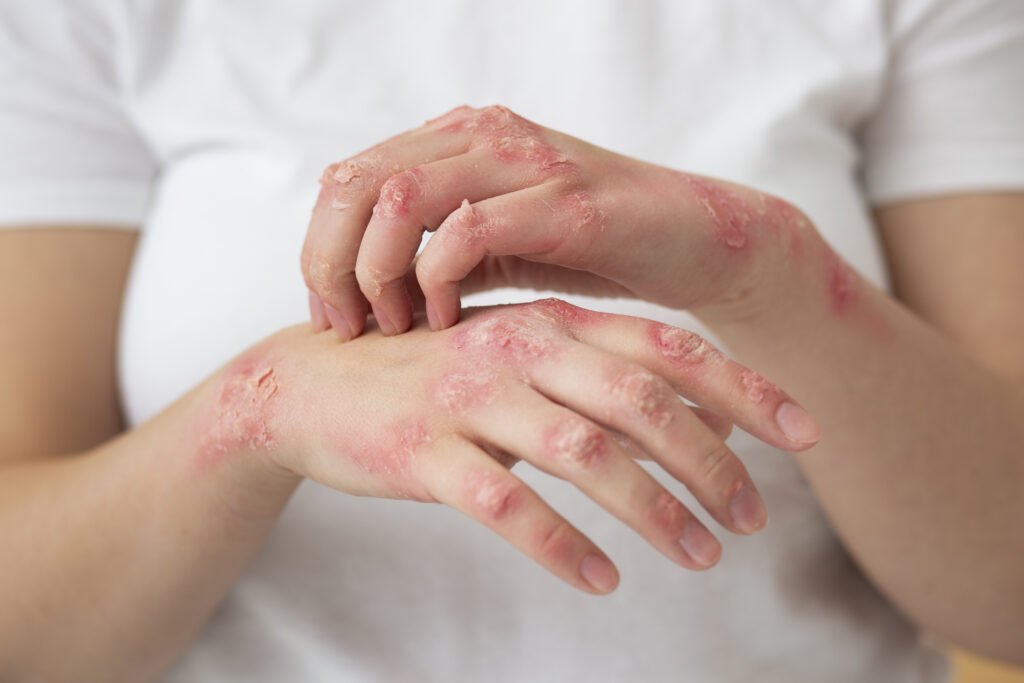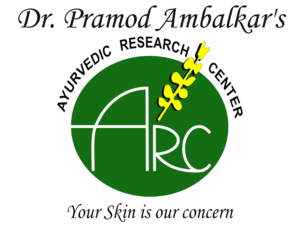- drambalkar@yahoo.co.in
- Mon - Sunday 10:00 AM - 02:00 PM
Best Ayurvedic Treatment for Psoriasis & How Does It Work?
Introduction
Tired of battling psoriasis? Have you tried countless conventional treatments with little success? Ayurveda, an ancient system of medicine, offers natural solutions for many health issues, including psoriasis, a skin condition that affects many people. In this blog, we will explore the best Ayurvedic treatment for psoriasis and explain how it works. You’ll learn about herbal remedies and practices that not only help with skin problems but also promote overall health.
What is Psoriasis?
Psoriasis is a chronic skin condition that causes the rapid growth of skin cells, leading to thick, red, scaly patches on the skin’s surface. It often appears on areas like the elbows, knees, scalp, and lower back, but it can occur anywhere on the body. These patches can be itchy and sometimes painful, and they may crack and bleed. The exact cause of psoriasis isn’t fully understood, but it is believed to involve an immune system problem that triggers inflammation and speeds up skin cell production. Genetics may also play a role, as the condition can run in families.

How Does Ayurveda Explain Psoriasis?
Ayurveda views psoriasis as an imbalance in the body, particularly involving the doshas—Vata, Pitta, and Kapha. According to Ayurveda, psoriasis is primarily linked to an aggravated Pitta dosha, which can lead to excessive heat and inflammation in the skin. This imbalance may result from various factors, including poor diet, stress, and environmental toxins. Treatment in Ayurveda focuses on restoring balance through natural remedies and lifestyle changes. The best Ayurvedic remedies for psoriasis include herbal formulations such as neem, turmeric, and aloe vera, which are known for their anti-inflammatory and cooling properties. These herbs help reduce heat in the body and soothe the skin.
Types of Psoriasis
Psoriasis is a chronic skin condition that speeds up the life cycle of skin cells, causing them to build up rapidly on the surface of the skin.
- Plaque Psoriasis: The most common type, characterized by raised, red patches covered with silvery-white scales, usually found on the elbows, knees, scalp, and lower back.
- Guttate Psoriasis: Appears as small, drop-shaped lesions, often triggered by a bacterial infection like strep throat. It typically affects children and young adults.
- Inverse Psoriasis: Found in skin folds (like under the breasts or in the groin), it appears as smooth, red patches without scales.
- Pustular Psoriasis: Characterized by white pustules (blisters of non-infectious pus) surrounded by red skin. It can occur in localized areas or cover large parts of the body.
- Erythrodermic Psoriasis: A severe, rare form that can cover the entire body with a red, peeling rash that can itch or burn intensely. It requires immediate medical attention.
Understanding these types helps in managing symptoms and seeking appropriate treatment.
Transform Your Skin Today! Discover the Best Ayurvedic Treatment for Psoriasis at Heal Psoriasis. Don't let psoriasis control your life. Experience the transformative effects of Ayurvedic treatment. Schedule your appointment now and say goodbye to itchy, flaky skin.
Ayurvedic Treatments For Psoriasis
Dietary Modifications:
Ayurveda believes that diet plays a crucial role in managing health conditions. A balanced diet can help balance the doshas and reduce psoriasis symptoms. Key dietary recommendations include:
- Incorporating anti-inflammatory foods such as turmeric, ginger, and garlic.
- Consuming fresh fruits and vegetables rich in antioxidants.
- Avoiding processed foods, sugar, and fried items that can trigger inflammation.
- Staying hydrated by drinking plenty of water and herbal teas.
Herbal Remedies:
Various herbs are known for their anti-inflammatory and skin-soothing properties. Some of the best Ayurvedic medicines for psoriasis include:
- Turmeric (Curcuma longa): Known for its powerful anti-inflammatory and antioxidant properties, turmeric can help reduce skin inflammation and improve overall skin health.
- Neem (Azadirachta indica): This herb has antibacterial and anti-inflammatory properties, making it effective in treating skin conditions. Neem oil can be applied topically or taken in capsules.
- Aloe Vera: Its soothing properties can relieve itching and help heal the skin. Aloe vera gel can be applied directly to affected areas.
- Brahmi (Bacopa monnieri): Known for its calming effects, Brahmi can help reduce stress, which is often a trigger for psoriasis flare-ups.
Panchakarma Therapy:
Panchakarma is a detoxification process in Ayurveda that aims to cleanse the body of toxins and restore balance. It involves five therapeutic treatments:
- Vamana (therapeutic vomiting): Helps expel excess mucus and toxins.
- Virechana (therapeutic purgation): Aids in detoxifying the liver and intestines.
- Basti (medicated enemas): Cleanses the colon and improves digestion.
- Nasyam (nasal administration): Cleanses the nasal passages and improves respiratory health.
- Raktamokshana (bloodletting): Reduces blood toxins and inflammation.
Consulting an experienced Ayurvedic practitioner is essential for this therapy, as they can tailor the treatments to individual needs.
Topical Applications:
Ayurvedic treatments also include various topical applications that can soothe and heal the skin:
- Ghee (clarified butter): Applying warm ghee can moisturize dry patches and help reduce inflammation.
- Herbal pastes: A mixture of herbs like neem and turmeric can be applied to the affected areas to alleviate symptoms.
Yoga and Meditation:
Yoga and meditation play a crucial role in Ayurveda, helping to manage stress and balance doshas. Psoriasis can be aggravated by stress, making these practices essential:
- Yoga Asanas: Poses like Adho Mukha Svanasana (Downward-Facing Dog) and Trikonasana (Triangle Pose) can improve circulation and relieve stress. Regular practice can also enhance flexibility and strength.
- Breathing Techniques (Pranayama): Techniques like Nadi Shodhana (alternate nostril breathing) can calm the mind and reduce stress levels. This can positively impact skin health by reducing flare-ups.
Incorporating yoga and meditation into daily routines can help manage psoriasis symptoms holistically.
Conclusion
Ayurveda offers a holistic approach to managing psoriasis, focusing on balancing the body’s doshas and promoting overall well-being. At Heal Psoriasis Hospital, we believe that nature holds the key to healing. Our Ayurvedic approach focuses on addressing the root cause of psoriasis, restoring balance to your body and mind. With our personalized treatment plans and expert guidance, you can experience relief from the discomfort and embarrassment associated with this condition.

Get in Touch with us Today to Begin Your Journey of Transformation

Contact Us
- Dr.Ambalkars Aayurvedic Research Centre, ARC Bhavan, Vijay Vihar Complex, Evershine City, Last Stop, Vasai (E)
- drambalkar@yahoo.co.in
- +91 9320193201
- +91 9766362776

